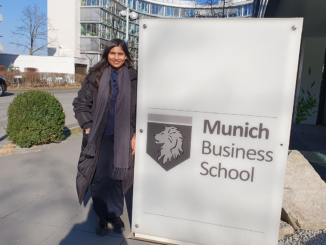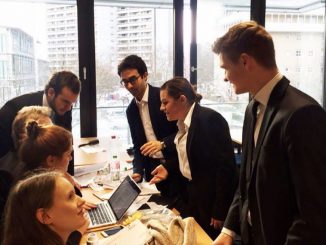
How do I deal with bad grades as a student after my excellent graduation from secondary school? Is there an alternative to a fridge full of pre-made pizza and a 24/7 desk? Am I at the risk of burning out or do I spend more time in the clubs than in the lecture hall? The transition from pupil to student, and later from young adult to businessman, confronts many young people with new challenges they often cannot cope with alone. This is where Student Coaching sets in: The concept is based on professionalized self-development and enables students to examine and check their student’s life situation and to improve themselves by own ideas, if need be.
Since 2010, Munich Business School has been pursuing a path that is globally unique: Student Coaching. As opposed to the offers of other universities, Student Coaching is not a tutoring, mentoring or “I coach you as you trod along” program. Much rather, it is a structured support aimed at making the transition from school to academic studies easier1.
The primary requirement for the program may also be its biggest weakness: Participation is voluntary. On the one hand, coaching can only be useful for students who themselves are willing to reflect their own situation and to change it, should that be necessary. (Well-meant) force would be out of place and counterproductive. As experience has shown, however, this approach will fail precisely those students who overestimate themselves or who are unable to make time as a consequence of their poor (!) time management!
Fortunately, the latter type can be partly helped by tutoring and student buddy programs. However, this help often comes too late – after a “learning curve” had already been taken.
A Student’s Life Can Be Challenging
Why had coaching never been offered at universities before? Why did we – at Munich Business School – develop a specific Student Coaching? To distinguish ourselves from other universities with regard to student support? Or to give concerned relatives and helicopter parents a good feeling?
As opposed to generation X, generation Y comes from a completely different background and has totally different needs. One aspect is that professional life confronts students with totally different requirements, demanding totally different skills2. At the same time, opportunities are so numerous and diversified that any decision is hard to make. Hardly any pupil will start his studies right after school. If possible, many students stay with their parents or, when in the middle of their thirties, still have their children’s room in their parents’ home, including original furnishing.
The freedom and flexibility that the Bologna Conference was meant to bring (with regard to the global homogenization of academic training and graduation) much rather led to even more rigid framework conditions. The freedom of academic life is characterized by school-type classes and training programs as well as exceeding performance pressure. This pressure is generated by society (above all by the schools), by parents and by the students themselves. Occasionally, this leads to absurd, fear-driven and exaggerated performance demands!
More than a Help for Self-Help
This is the situation of today’s students. The picture of lazy students lying in the sun on a meadow is fading. However, the challenge of generation Y is the same as that of generation X, the parents’ generation: For the first time, the students must stand on their own feet, have to organize themselves and manage their subject matter. In this situation, they have less spare time (as compared with their school days), the first solid personal friendships and relationships are forming and the first deaths and diseases are taking place in their closer circle.
For young people, all of this is complicated – and often they do not have anyone to talk to personally about it. In addition, many students expect of themselves a constantly high performance under this pressure. Resting periods are abbreviated, as they are considered unnecessary; and unrealistic learning packages are uploaded; a noisy or instable learning environment is compensated by longer learning hours. Often, the burdened students cannot even see that babysitting three younger siblings might put the learning success at risk! And the weekly trip home to the parents on weekends may also not always be helpful.
Solving Problems Through Self-Reflection
This is where Student Coaching places the lever: By sophisticated interviewing methods, the thoroughly trained Student Coaches provoke self-reflection in the student, i.e. his revising and evaluating options. It is more than a mere cognitive process, it strengthens the student’s personality, trains solutions-oriented thinking (which later in professional life becomes a necessity) and expands the student’s perspective to other possibilities – what today is called “thinking out of the box”.
To be able to guarantee such a professional Student Coaching, neither our university nor the many volunteering Student Coaches spare expense or trouble: All personally selected trainers are trained by a certified senior coach of a renowned coaching association and re-certified once (!) a year.
Even if many students might prefer a “specific yes or no”, which an experienced student or coach could easily give: The long-term benefit of Student Coaching is so enormous, exactly because the student is forced to reflect his situation himself and to come up with the suitable tailored solution.
1 Albrecht, E. (2016). Business Coaching – Ein Praxislehrbuch, De Gruyter Oldenbourg Verlag
2 Albrecht, A. (2014). Wunsch und Wirklichkeit der Generation Y, Unternehmeredition Personal (Vol.5), p. 40f





